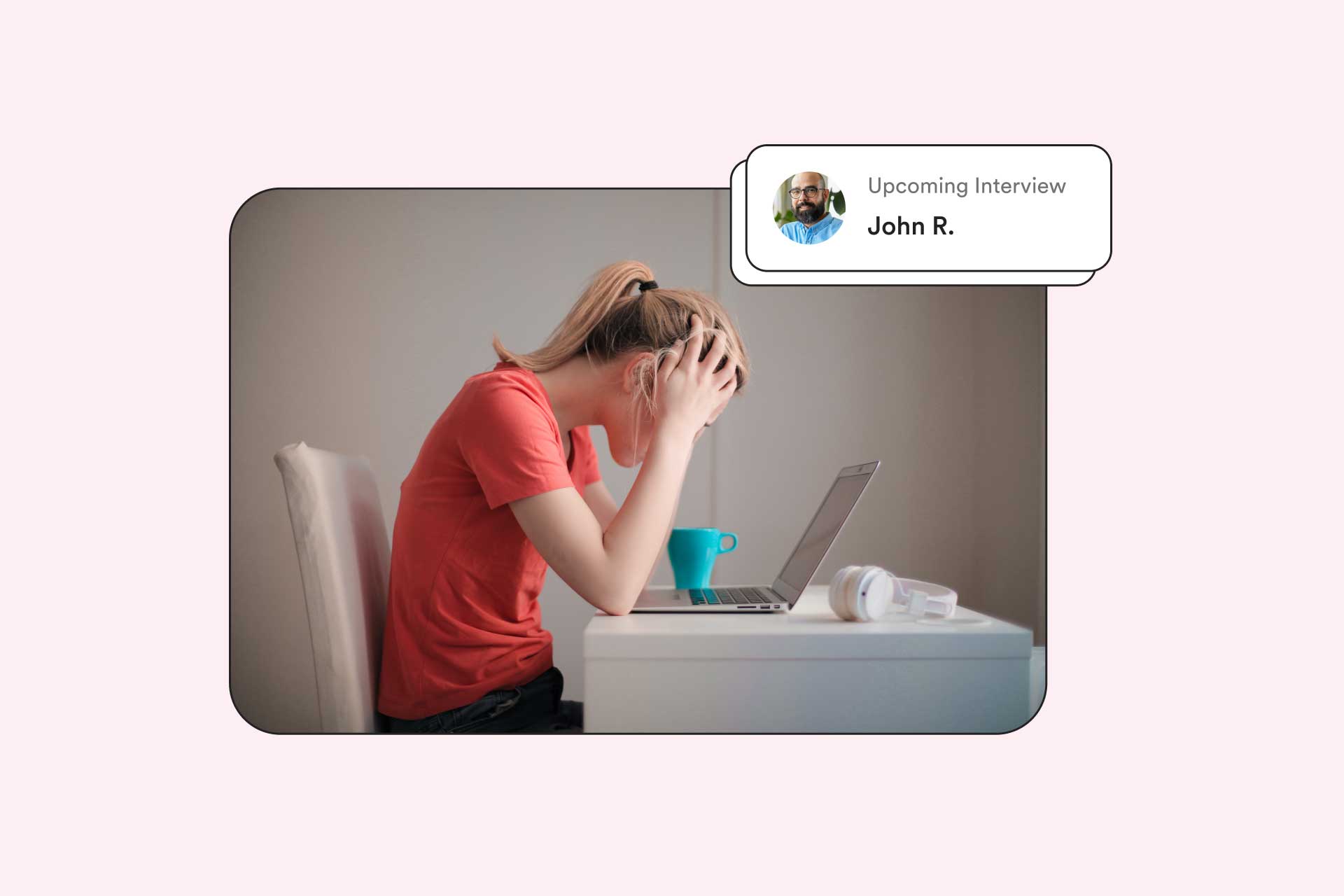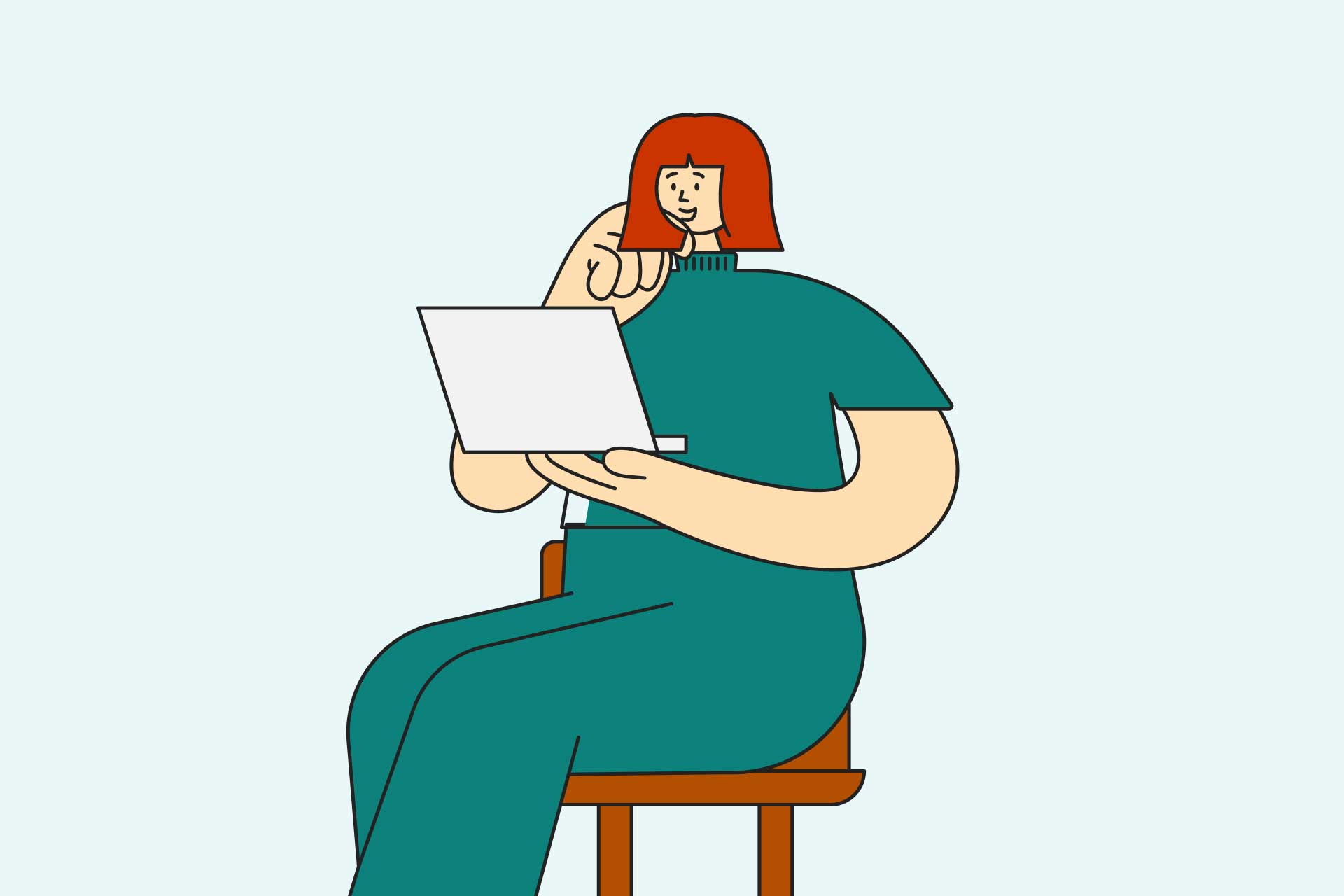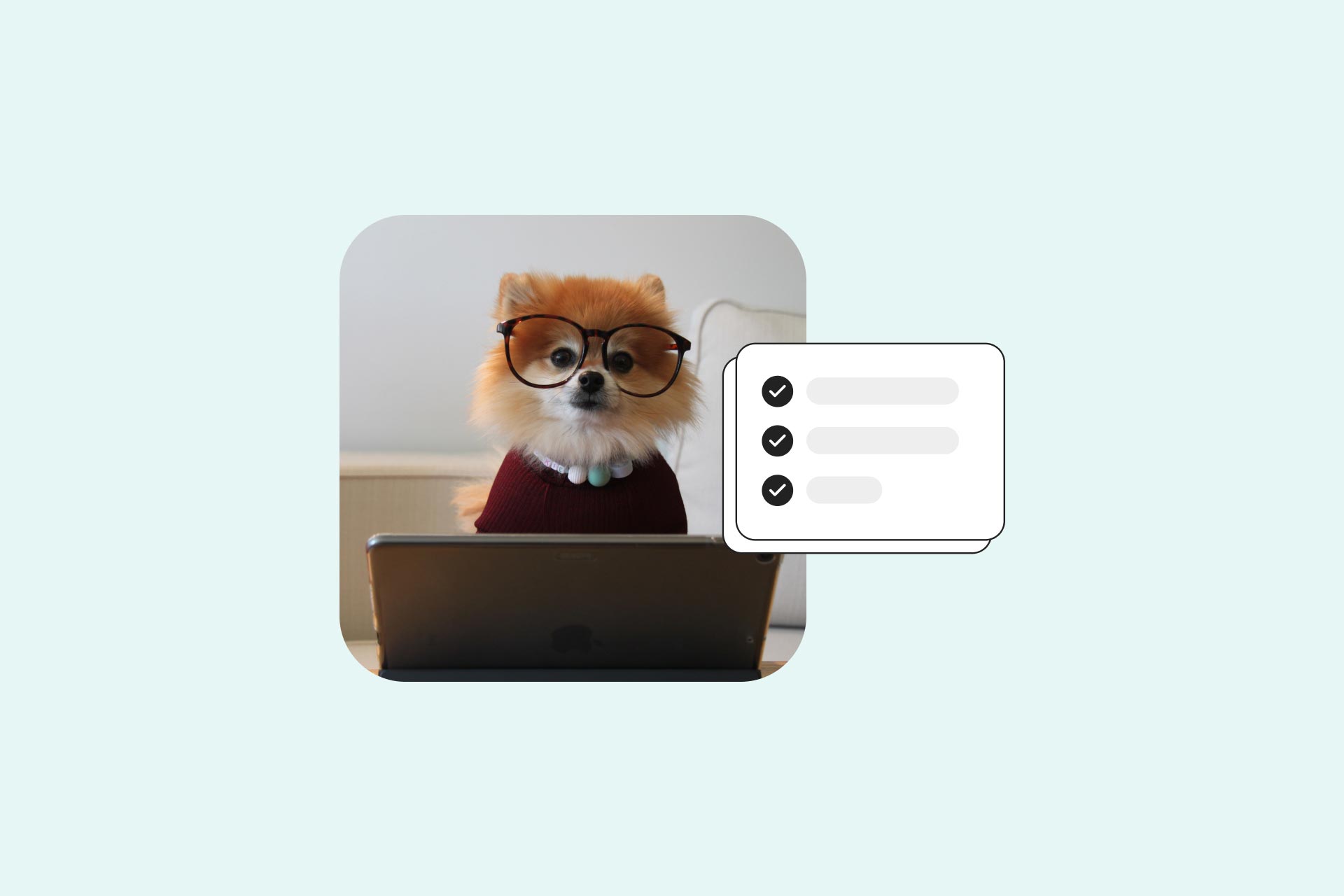Interview Anxiety: How to Calm Nerves Before an Interview
Interview anxiety is normal, but it shouldn't stop you from doing your best. So how do you calm your nerves before an interview? Pick up solid tips here.

Interview anxiety is an almost universal feeling. Even the most well-prepared people can get the jitters before facing an interviewer. That’s why you—and a ton of other people—want to learn how to calm nerves before an interview.
To help, we have tons of practical tips to overcome or minimize job interview anxiety.
Here’s what we will discuss in this blog post:
- Why do I get interview anxiety?
- How to get over interview anxiety: A step-by step guide
- Practical experience to overcome interview anxiety
Aside from learning tips to manage your interview anxiety, you’ll also learn ways to build up your confidence in this post. One interesting way to boost your confidence is through an apprenticeship. You’ll gain confidence as you build in-demand skills under the tutelage of a mentor who can explain what they look for in job interviews.
Before we figure out how to calm down before an interview, let’s look at some reasons why we get interview anxiety in the first place.
Why do I get interview anxiety?
- Human response to danger
- Overthinking
- Lack of preparation
- Interviewer is unwelcoming
- Fear of judgment
1. Human response to danger
Dr. Sherry Benton, founder of a behavioral health therapy platform, says anxiety comes from the brain’s response to danger. In fact, Dr. Noam Shpancer characterizes anxiety as a “persistent apprehension regarding potential future threats”.
In other words, your mind and body are hardwired to protect you from anything that can hurt you. Considering that job interviews—from the process to the results—are full of uncertainties, your mind is likely reacting to the risks. Dr. Benton says of interview anxiety:
“Interview anxiety essentially stems from the thought that someone’s quality of life depends on their performance in an interview.”
This normal response to danger usually leads to:
2. Overthinking
“If I don’t get this job, I’ll never start my career.”
“I shouldn’t apply because I won’t get the job anyway.”
Sounds familiar? A lot of applicants may have these thoughts as a result of overthinking, a natural development from interview anxiety.
As you can guess, there’s a cycle at work here. Anxiety leads to overthinking, which leads to excessive worrying (and more overthinking), which then feeds back into anxiety. And if left untreated, this can lead to a cycle that can develop into chronic anxiety and depression.
3. Lack of preparation
A lack of preparation can cause a spike of nervousness and anxiety in job seekers. It’s natural: what if the interviewer asks you a question you never prepared for? What if the information I have isn’t enough?
Situational anxiety can come from feeling unprepared. After all, you may not have done any research on your job posting, or the company you applied to. You may have even forgotten to set an alarm the day before your interview!
Feeling anxious from unpreparedness is different from feeling performance anxiety. This is a type of anxiety where one feels “apprehension and fear of the consequences of being unable to perform a task”. It can also be anxiety over the expectation of performing better or getting better results.
It’s also different from having atelophobia, or an irrational fear of making any mistakes. In this case, even if someone prepares perfectly for their interview, they still feel they haven’t prepared enough.

Interview anxiety can come from feelings of unpreparedness and a cycle of overthinking.
4. Interviewer is unwelcoming
It’s not uncommon to encounter a rude interviewer. They may show up late—intentionally or unintentionally—move the interview to another time arbitrarily, alienate you with rude questions, or come in completely unprepared.
This can increase your own anxiety. Depending on your personality, you might either be lead to think that an interviewer’s rudeness is your fault, or that you can act in a way that will make the interviewer like you more.
The truth is, some interviewers are rude for a reason. You could be undergoing a stress interview, where applicants are purposefully put into unpleasant situations to test how they react under pressure.
But note that stress interviews are common in only a handful of industries. You certainly would expect to see it more in service or intelligence-based jobs than marketing jobs. Plus, there are questions that are illegal to ask even in a stress interview.
5. Fear of judgement
Being judged is a big source of anxiety for some people. It can affect their ability to communicate with others or carry out daily tasks. They may or may not even have social anxiety disorder, which is a treatable disorder where one has an “intense, persistent fear of being watched and judged by others.”
Even without social anxiety disorder, it’s understandable why being judged might be uncomfortable for some. This can stack on top of a fear of having no control over a situation.
So now that you know what causes interview anxiety, here’s a few tips on how to calm down before an interview.
How to get over interview anxiety: A step-by step guide
The thing about interview anxiety is that it persists before, during, and after your interview. So here are tips for interviews you can use during all stages to help calm your nerves.
Before the interview
- Take care of your body and mind
- Mindfulness exercises
- Prepare your route or router
- Research your position and company
- Practice your interview
1. Take care of your body and mind
You can’t do anything if your body and mind aren’t ready.
The day before—or the morning of—your interview, try to avoid too much caffeine. Caffeine in coffee can induce anxiety-like symptoms, such as nervousness and restlessness. You might even have gastrointestinal problems, as coffee stimulates your colon.
You’ll also have trouble sleeping if you have too much caffeine. Sleep’s important for keeping your body and mind in tip-top shape. Adults aged 18 to 64 need at least 7 to 9 hours of sleep to keep their energy and brain functions up.
When the day of your interview comes, you should try to exercise, shower, dress in clothes you like that fit the dress code. Endorphins, good hygiene, and wearing clothes you feel good in boosts your self-confidence. Looking fresh will also leave a good first impression on your interviewer!
2. Mindfulness exercises
Mindfulness exercises can help your mind process your anxiety and get it ready. Being mindful can help you stay in the moment, and guide your brain away from thinking of worst-case scenarios.
A useful exercise is to visualize your success. You can think up a mental roadmap on how you can get the best results.
Meditation and light breathing exercises will also help keep your mind in the moment. You can even use dedicated apps to guide you through mindfulness meditation, including:
3. Prepare your route or router
If your interview is on-site, it’s best to know how to get there before the day of the interview. Google Maps can help you plot a route to your destination and save it for offline use. If you can’t find a route outright, there are ways to find alternate routes.
But if your interview’s online, you can also take steps to ensure your internet connection stays stable. Check if your internet is fast enough for a video call, and that no other device uses your connection during the call. Take a peek at your modem, router, or cables to see if they’re physically fine, and replace them if necessary.
You can still fix your internet connection if it goes south during your call. Have pages that teach you to troubleshoot your connection bookmarked and stored offline, so you have references ready when trouble comes.

Be prepared for any sudden internet outages, and try to show up to your interview looking fresh. First impressions last!
4. Research your position and company
Don’t fall victim to this easily avoidable problem! Before your interview, you should re-read the job post you applied for, or the information sent to you about the position if you were scouted. Read up on what’s expected of that position, and find ways to relate your experiences to that.
Then, use websites such as Glassdoor, Monster, and LinkedIn to research the company you’re applying to. Look up their company’s website, learn about their accomplishments, products and services, and goals. On the flip side, you should look for any negative press about the company. You can assess if you want to proceed with the interview, or form a mental checklist about which topics to avoid or carefully approach.
5. Practice your interview
You can somehow prepare for rude interviewers and unexpected questions by practice. Simulate a job interview experience by dressing for the part, setting up a space for it, and answering a set of practice questions. If you have someone to practice with, ask them for help!
There’s plenty of job interview simulations on Youtube that you can try out. Additionally, you can record yourself as you practice, so you can review how you performed afterwards.
In the process, you should also practice thinking up of ways to describe yourself. This can also help you form your thoughts on the fly. You’ll also find it easier to answer standard interview questions, and prepare for unexpected ones.
During the interview
- Turn anxiety into excitement
- Don’t rush through, STOP
- Be a STAR
1. Turn anxiety into excitement
You can turn you anxiety into excitement with the help of cognitive reappraisal. Cognitive reappraisal is a technique where you reinterpret a situation to change its emotional impact on you.
Let’s take a look at this study by Harvard Business School assistant professor Dr. Alison Woods Brooks. In her study, she discovered that telling people to calm down before an exam makes them less likely to do that.
Instead, it’s easier for an anxious person to change anxiety to excitement. Your body’s response to anxiety and excitement is the same, but their effect on your performance is different. They both make your heart beat faster, but anxiety makes you perform worse, while excitement helps you do better.
So when you’re thinking, “I don’t want to continue because I might make a mistake,” try to reform your thoughts as, “I’m thrilled to proceed with this opportunity”. Consciously telling yourself something helps your brain believe it, so something as simple as “I’m excited!” can help you out.
2. Don’t rush through, STOP
The STOP method is another popular mindfulness trick. However, it earned its own section because it’s related to an important tip: Take your time in interviews.
Let’s start by defining the STOP method.
- Stop
- Take
- Observe
- Proceed
First, you stop or pause your thoughts to take deep breaths to center yourself. Then, you observe what’s happening to your body, emotions, and mind. After that, you proceed with your task while consciously taking into account what you’ve learned. You can also use these insights to do better in an interview next time.
For example, a practice question—or a real one during your interview—stumps you. You should pause and take a moment to check-in with yourself. Do you feel your hands and feet go cold? Are you nervous? Did the question make you think of something in particular? Keep your insights in mind as you proceed with the interview.
It’s okay to take time to answer interview questions. Instead of going through it as quickly as possible, consider what your interviewer is saying and make the atmosphere comfortable.
3. Be a STAR
Did you prepare for your interview? That’s great! But what if you still can’t get the words out, despite preparing for it? We recommend using the STAR method.
STAR is an acronym for:
- Situation
Task
Action
Result
For example, your interviewer might’ve asked you to describe a time you had a difficult situation at work. Your first step is to set the scene or situation. Next, describe what your role was in the task involved, and what your exact actions were in the situation. Then, explain the results.
Let’s look at an example answer:
Our team had to take over a project from another cluster after the client asked for a change in partners. Problem is, our team leader quit before the transfer was made final. I elected to take over the team despite being the newest person there, as I understood the project the best, and had the best rapport with my teammates.
To begin, I ensured all relevant assets and information were passed on between teams. I then met with the client to reassess the issues that led to the transfer. We worked on details and clarified what my team could do, and what should be dealt with in-house.
I eventually created an action plan that satisfied the parameters we worked out. While it took us a week longer than expected, the client signed a long-term deal with the company after the project’s conclusion, showing their trust in our services.
After the interview
- Check on your health
- Review your responses
- Follow-up, but don’t over-text

Decompressing helps relieve your post-interview anxiety. Try to relax with your loved ones or a hobby after the interview.
1. Check on your health
Post-interview anxiety is real, but it doesn’t have to overcome you. Just as you did before your interview, you should check in with your health. Make sure your body’s well-rested and your mind is clear.
Try doing the body and mind exercises you did before your job interview. This can help you cool down and find your focus again. You can also try catching up with your loved ones, or picking up one of your hobbies to help you get back on track.
2. Review your responses
Taking stock of your responses in an interview can help you calm down and feel better about your interview.
If you need help starting out, start by going over your responses to questions about you and your CV. Think of how you answered, what details you gave out, and if you were satisfied with the way you answered. If you’re inclined to do so, try to come up with an action plan to address any problems you have about your answers, so you can do better next time.
3. Follow-up, but don’t over-text
Following up after your interview is a must in general. That way, you’ll receive updates on how your application is progressing, and you’re showing that you’re highly motivated to get the job. You’ll also relieve your post-interview anxiety.
But when you do ask for updates, fight the urge to reach out too often. This might put off your contact and affect your chances.
Try to wait 5 business days after your interview before you send your note. Here’s a format you can try out:
Dear [name of interviewer],
Thank you for the great interview last week. It was a pleasure meeting you and learning more about the [role].
The more I think about what we’ve discussed, the more I feel excited about joining [company] and completing the team. My experience in [field] fits the needs of the team perfectly, and I can’t wait to contribute and reach their goals.
I’m confident my [specific skill or experience] and [related job or educational background] will address the concerns you mapped out in our interview, and support the team’s long-term plans. Please let me know if you need additional information about my experience, or more pieces from my portfolio.
Looking forward to hearing from you,
[Name]
[Contact information]
Practical experience to overcome interview anxiety
As said earlier, unpreparedness is a big part of why some people get interview anxiety. Sometimes, this lack of preparation goes beyond forgetting to research a role or a company. It may even stem from feeling unprepared because of their work experience—or lack thereof.
One surefire way of getting work experience and building confidence is through apprenticeships.
An apprenticeship helps you learn on the job without the frills of an internship. That means you’re 100% focused on learning skills and gaining experience directly related to the industry you want to work in. You’re also learning from doing real-world tasks, so your skills are sure to be in-demand.
Best of all, you’ll be working with a mentor deep in your industry of choice. Your mentor will give you valuable advice, including tips on how to interview effectively. And if all goes well, your mentor may even offer you a job for the kind of work you’ve apprenticed for.
Job interviews don’t have to be tough, as long as you’re well-prepared and keep your head on straight. Get excited, and be sure to save this post to help you out in a pinch.
Five years in journalism, two in proofreading, and eight in freelance ghostwriting. Creating content that's entertaining, informative, and actionable shapes my writing. When not scrutinizing my copy, I'm likely watching hockey.
-
Career Prep
Top Marketing Webinars for Digital Marketers in 2025
By attending these webinars, you will have the opportunity to learn from industry leaders, gain insider knowledge, and stay ahead of the competition.
-
Career Prep, News
9 Types of Digital Marketing to Choose From in 2025
Digital marketing is a dynamic field that offers diverse career opportunities. From search engine optimization to social media marketing, there are many specializations to explore. Whether you're just starting out or looking to switch careers, this guide will help you find your ideal digital marketing niche.

Subscribe to our newsletter for digital marketing resources
Become a better marketer with our digital marketing resources and tips shared weekly in your inbox.

Get started with Acadium
Build your marketing career for free or find marketing talent on any budget — fully remote.


